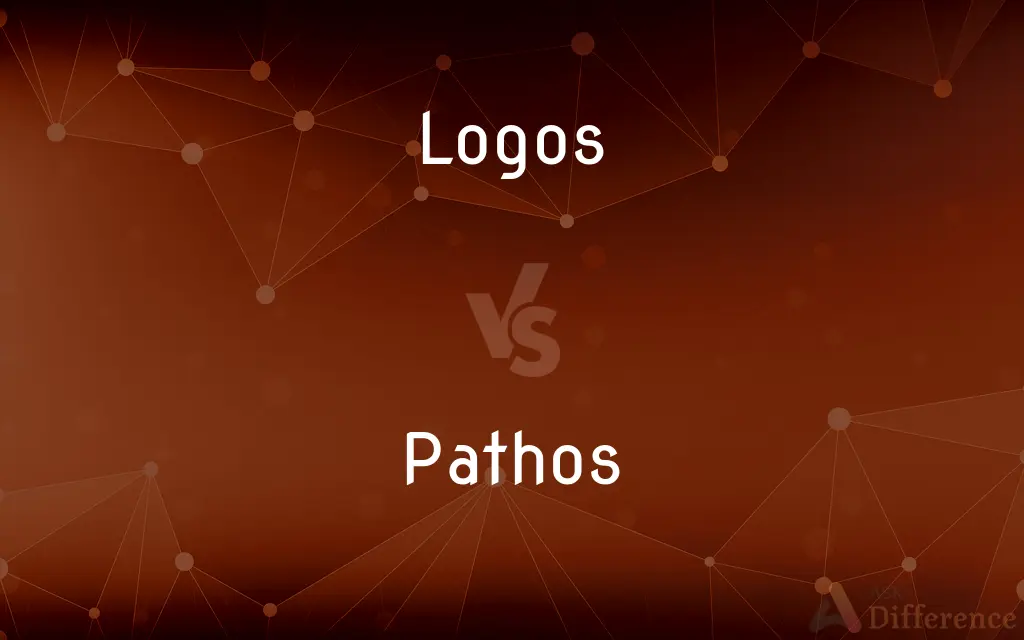Logos vs. Pathos — What's the Difference?

Difference Between Logos and Pathos
ADVERTISEMENT
Compare with Definitions
Logos
Logos (UK: , US: ; Ancient Greek: λόγος, romanized: lógos; from λέγω, légō, lit. ''I say'') is a term in Western philosophy, psychology, rhetoric, and religion derived from a Greek word variously meaning "ground", "plea", "opinion", "expectation", "word", "speech", "account", "reason", "proportion", and "discourse". It became a technical term in Western philosophy beginning with Heraclitus (c. 535 – c. 475 BC), who used the term for a principle of order and knowledge.Ancient Greek philosophers used the term in different ways.
Pathos
Pathos (, US: ; plural: pathea or pathê; Greek: πάθος, for "suffering" or "experience" or "something that one undergoes," or "something that happens to one". In medicine it refers to a "failing," "illness", or "complaint.
Logos
The Word of God, or principle of divine reason and creative order, identified in the Gospel of John with the second person of the Trinity incarnate in Jesus Christ.
Pathos
A quality that evokes pity or sadness
The actor injects his customary humour and pathos into the role
Logos
(in Jungian psychology) the principle of reason and judgement, associated with the animus.
ADVERTISEMENT
Pathos
A quality, as of an experience or a work of art, that arouses feelings of pity, sympathy, tenderness, or sorrow.
Logos
In pre-Socratic philosophy, the principle governing the cosmos, the source of this principle, or human reasoning about the cosmos.
Pathos
The feeling, as of sympathy or pity, so aroused.
Logos
Among the Sophists, the topics of rational argument or the arguments themselves.
Pathos
The quality or property of anything which touches the feelings or excites emotions and passions, especially that which awakens tender emotions, such as pity, sorrow, and the like; contagious warmth of feeling, action, or expression; pathetic quality.
Logos
In Stoicism, the active, material, rational principle of the cosmos; nous. Identified with God, it is the source of all activity and generation and is the power of reason residing in the human soul.
Pathos
(rhetoric) A writer or speaker's attempt to persuade an audience through appeals involving the use of strong emotions such as pity.
Logos
In biblical Judaism, the word of God, which itself has creative power and is God's medium of communication with the human race.
Pathos
(literature) An author's attempt to evoke a feeling of pity or sympathetic sorrow for a character.
Logos
In Hellenistic Judaism, a hypostasis associated with divine wisdom.
Pathos
In theology and existentialist ethics following Kierkegaard and Heidegger, a deep and abiding commitment of the heart, as in the notion of "finding your passion" as an important aspect of a fully lived, engaged life.
Logos
(Christianity) In Saint John's Gospel, especially in the prologue (1:1-14), the creative word of God, which is itself God and incarnate in Jesus. Also called Word.
Pathos
Suffering; the enduring of active stress or affliction.
Logos
(rhetoric) A form of rhetoric in which the writer or speaker uses logic as the main argument.
Pathos
That quality or property of anything which touches the feelings or excites emotions and passions, esp., that which awakens tender emotions, such as pity, sorrow, and the like; contagious warmth of feeling, action, or expression; pathetic quality; as, the pathos of a picture, of a poem, or of a cry.
The combination of incident, and the pathos of catastrophe.
Logos
Alternative case form of Logos
Pathos
The quality or character of those emotions, traits, or experiences which are personal, and therefore restricted and evanescent; transitory and idiosyncratic dispositions or feelings as distinguished from those which are universal and deep-seated in character; - opposed to ethos.
Logos
A word; reason; speech.
Pathos
Suffering; the enduring of active stress or affliction.
Logos
The divine Word; Christ.
Pathos
A quality that arouses emotions (especially pity or sorrow);
The film captured all the pathos of their situation
Logos
The divine word of God; the second person in the Trinity (incarnate in Jesus)
Pathos
A feeling of sympathy and sorrow for the misfortunes of others;
The blind are too often objects of pity
Pathos
A style that has the power to evoke feelings
Share Your Discovery

Previous Comparison
Telluride vs. Tellurium
Next Comparison
Desiccate vs. Exsiccate













































